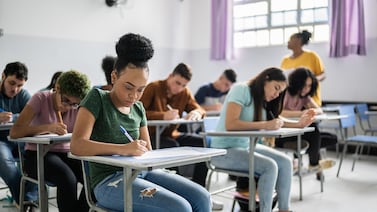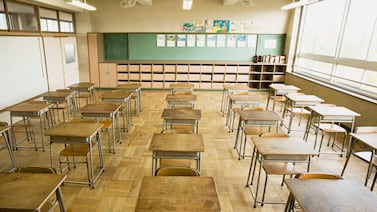Sign up for Chalkbeat New York’s free daily newsletter to keep up with NYC’s public schools.
As testing season rapidly approaches, some New York City educators are worried that their students — and schools — aren’t fully prepared to swap out paper exams for a computer-based model.
But ready or not, this year the city’s fifth and eighth graders will do just that, as the state embarks on the next step in a multi-year phase-in of computer-based testing.
The annual exams measure student performance in reading, math, and science, testing the state’s third through eighth grade students. Though more than 16,000 kids took the exams on computers last year, next month that number will skyrocket to well over 140,000 students in the city.
English exams will take place between April 11-19, while the math tests will occur between May 7-17. Science tests, which are only taken by fifth and eighth grade students, will take place between May 15-17.
It’s the first major step in the three-year transition, with fourth and sixth grade students set to ditch paper tests next school year, followed by third and seventh graders by spring 2026. State officials have said computer-based testing can make the assessments more efficient and flexible, as well as opening a pathway to computer-adaptive testing that adapts questions based on student responses.
Over the course of the school year, the city has stressed the importance of ensuring students have access to devices — making them available to schools upon request and expediting repairs to non-working devices, according to the city’s Education Department. Officials said they have also taken proactive measures to bolster connectivity at schools administering computer-based exams.
Across the city, an additional 185 schools have opted into digital English exams for some portion of their third, fourth, sixth, or seventh graders, while 166 schools have done so for math.
Students with disabilities that impact their ability to use a keyboard may also receive assistive technology or other accommodations, city officials said.
But still, the prospect of digital exams has spurred concerns among some educators, who fear students could see drops in performance, especially among those who lack access to technology at home, potentially widening gaps between students.
And in the wake of a citywide tech meltdown last month, some remain skeptical that digital exams will run smoothly.
“I’ll be completely transparent,” said Kiri Soares, principal of the Urban Assembly Institute of Math and Science for Young Women in Brooklyn. “I don’t feel prepared at all.”
Computer-based tests open new opportunities
To Howard Everson, a member of a technical committee advising the state on the transition, the shift to computer-based testing is an opportunity for New York to catch up with other states.
At least 48 states have successfully implemented some form of computer-based testing for state exams, according to a 2022 state memo.
“The vast majority of kids are using some sort of online device in their classrooms,” said Everson, a professor of educational psychology and psychometrics at the CUNY Graduate Center. “We think that it’s going to be a benefit in the long run. … The things you can do on a two-dimensional piece of paper and what you can do in a multi-dimensional computer are worlds apart.”
Computers allow for more innovative testing models, with questions that, for example, ask students to move information around a screen or interact with graphics, he explained.
“Multiple-choice, fill-in-the-bubble tasks are an artifact of the past,” he said. “How we measure these underlying abilities in reading and in math is going to be much more imaginative.”
Computer-based testing can also lessen the burden on schools, allowing for more efficient grading and quicker results, Everson said. Though he doesn’t expect to see any notable performance drops as a result of computer-based testing, results of the exams will be closely monitored. For Everson, concerns are more centered around potential technical difficulties.
“Those have been the most ongoing sorts of problems that we’ve seen in other states over the years,” he said. “But from what I understand from my colleagues in the city system, they’re ready for it.”
Educators worried about digital literacy skills
For eighth graders at the Institute of Math and Science, Soares worries the shift to computer-based testing this year will cause performance to drop across the board.
“It’s testing them not on the knowledge per se, but on their digital literacy under very stressful situations,” she said. “When you start testing kids’ digital literacy, you really start wading into the inequities of our culture.”
Martina Meijer, a fourth grade teacher in Brooklyn, worries that students across the city have not received sufficient instruction in using technology.
Her school has opted into computer-based testing for grades three and four. Though every student has a device issued by the school, just 14 out of 22 students have laptops, while others have been using tablets for digital activities, according to Meijer. By the time state exams arrive, those students will switch over to laptops, but their skills may be limited.
In particular, Meijer fears students will struggle on open-ended response questions, which at times ask students to write essays.
“Typing is something that, like anything, gets better with repetition, explicit instruction, and with practice,” she said. “Some of my students have computer access at home and have been online, but for the most part, my students are hunting and pecking. The volume that they can generate on a typed essay is significantly shorter than anything that they can write.”
Meijer has been taking time out of lessons to help students develop digital literacy, but added she’s concerned by the lack of a citywide plan to help kids foster those skills.
“There’s no systematic approach,” she said. “This continues to be something that is dumped onto the shoulders of teachers.”
Some studies have found students tend to do worse on exams taken on a computer or tablet. But research isn’t definitive, according to Michael Russell, a professor of measurement, evaluation, statistics, and assessment at Boston College. Though many states have already switched over to a computer-based model, there have been different outcomes across the country.
“There’s a lot of factors that influence it,” he said. “If a state is very aggressive in putting out practice tests, and encouraging teachers to have students interact with the interface, that typically decreases any kind of effect you’re going to see.”
The design of the test interface and the test itself can act as further variables in the process — with some questions, such as those that call for lengthier written responses, more likely to present challenges to some students, he said.
Still, the shift to computer-based testing can be beneficial for those who are comfortable with the technology, he added.
More than two decades ago, Russell conducted research on the impact of switching to computer-based testing for writing assessments. Students who had extensive experience with computers tended to see a positive impact, while those with little prior experience saw the opposite occur.
“If you’re a teacher that’s concerned about this, give your students an opportunity to practice — have them do it twice,” Russell added. “So that the only thing that’s really new to them when they’re going to take the test is the content of the test itself.”
In January, more than 3,800 schools across the state participated in a simulation of computer-based exams, with over 750,000 student test sessions submitted, said JP O’Hare, a spokesperson for the state’s Education Department. That allowed students to gain familiarity with the system and helped schools evaluate the readiness of their internal systems and hardware, he added.
An online question sampler is also publicly available, offering further opportunities for students, educators, and families to become familiar with computer-based testing, O’Hare said.
Even if kids are ready, will the tech be?
For some teachers in the city, digital literacy has been less of a concern. One eighth grade teacher in District 9 said his students are particularly tech-savvy, even as they’ve suffered from learning losses and difficulties with engagement as a result of the pandemic.
“They are whizzes with laptops,” said the teacher, who requested anonymity because he wasn’t authorized to speak by his school. “These kids might have a career as hackers.”
Still, the District 9 teacher is concerned about the logistics of shifting to computer-based testing. He said it’s always difficult to find enough working Chromebooks for his class, with between a quarter and a third of them typically experiencing technical issues on a given class day.
His school also experiences issues with internet connectivity about once or twice a week, the teacher added.
“It’s all a little bit anxiety-inducing for a teacher,” he said.
Meijer shares those concerns, noting that in other digital assessments, her class has experienced disruptions in internet connection.
Jenna Lyle, a spokesperson for the city’s Education Department, said any families concerned about the shift should reach out directly to their schools.
The move to computer-based testing is part of a broader trend occurring in schools, with students and teachers regularly using technology during the school day, according to city officials.
“Our students continue to live in a more digital world,” Lyle said. “Both in and out of the classroom.”
Julian Shen-Berro is a reporter covering New York City. Contact him at jshen-berro@chalkbeat.org.







